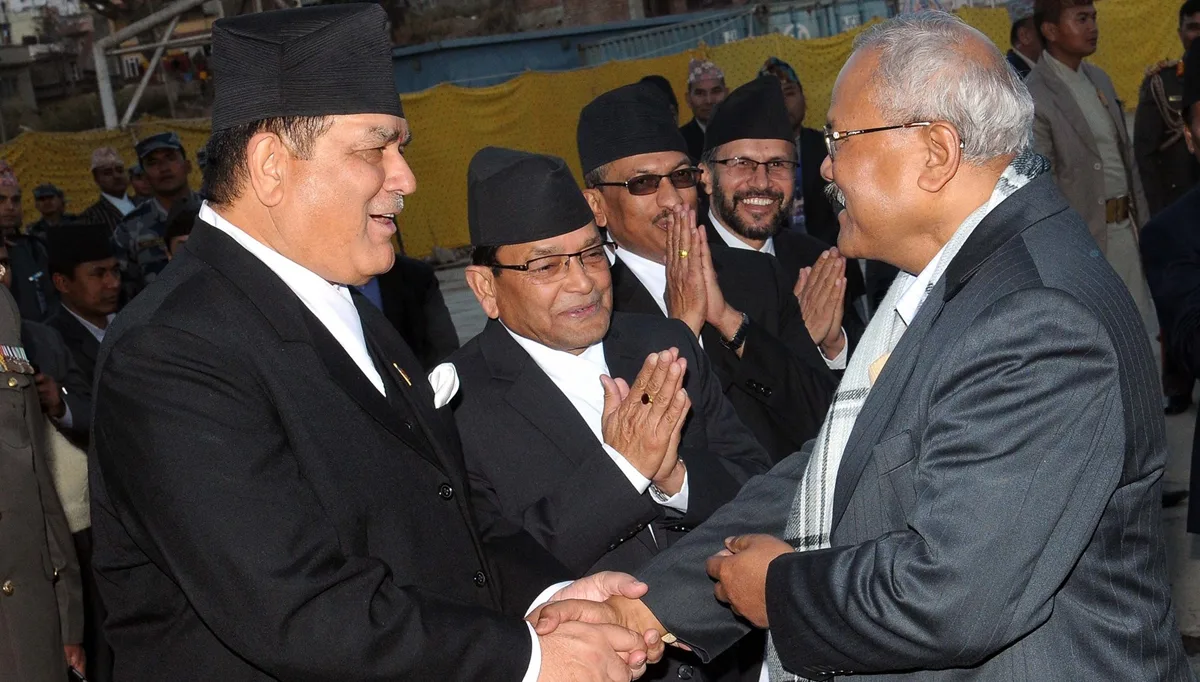KATHMANDU: Nepal’s constitution presents an intriguing stipulation regarding the qualifications for officials in its constitutional bodies.
Specifically, nine out of thirteen commissions require appointees to possess ‘high moral character’.
Notably, this requirement applies to key bodies such as the Commission for the Investigation of Abuse of Authority (CIAA), Office of the Auditor General, Public Service Commission, Human Rights Commission, and Election Commission.
Conversely, the constitution is silent on the requirement of ‘high moral character’ for officials of the Indigenous Commission, Madhesi Commission, Tharu Commission, and Muslim Commission, leaving these criteria to be determined by law.
Recently, the Constitutional Council unanimously recommended Krishna Man Pradhan, former president of the Nepal Law Society, for the role of Election Commissioner.
The decision was endorsed during the tenure of the previous Prime Minister Pushpa Kamal Dahal Prachanda government by key figures including Prime Minister Dahal, Chief Justice Bishwambhar Prasad Shrestha, and current Prime Minister KP Sharma Oli.
In some instances, defining ‘high moral character’ may involve a negative approach, considering factors such as accusations of corruption, dismissal for breaching official conduct, or findings of human rights abuses by commissions or committees established by law.
Pradhan’s parliamentary hearing for the Election Commissioner position is ongoing.
However, discussions have turned contentious, particularly concerning questions about his moral character.
Some MPs and complainants have raised concerns based on allegations of past improper conduct with a woman.
The debate hinges on whether Pradhan meets the constitutional criteria of being a ‘person of high moral character’.
Critics point to a legal settlement involving allegations against him as indicative of his character. This issue is currently under intense scrutiny within the parliamentary Hearing Committee.
The outcome of these deliberations will determine whether Pradhan is deemed fit to hold the esteemed position of Election Commissioner, based on the constitutional requirement of ‘high moral character’.
In the Constitution of Nepal since 2015, the term ‘individuals with high moral character’ has been referenced, yet the constitution itself does not provide a specific definition.
There is a notable absence of a formal definition in the law, but this does not imply that the constitution, laws, or courts do not recognize individuals with high moral character.
A pivotal 105-page judgment delivered by Supreme Court justices Ishwor Prasad Khatiwada, Ananda Mohan Bhattarai, and Anil Kumar Sinha on January 8, 2017, elaborately defines ‘an individual of high moral character’.
This judicial interpretation serves as a significant reference for bodies such as the parliamentary hearing committee in assessing candidates like Krishnaman Pradhan.
The Supreme Court categorizes individuals into three character types: those with high moral character, those with average moral character, and those lacking character or morally degraded.
The doctrine of ‘high moral character’, as expounded by the Supreme Court, plays a crucial role in determining the eligibility of constitutional office holders.
This criterion was enshrined in the Interim Constitution of Nepal following the People’s Movement II and continues to be central in contemporary constitutional interpretations.
The interpretation and application of ‘high moral character’ and its association with ‘reputation’, as stipulated in Article 119 of the Interim Constitution, appear broad and context-dependent.
Evaluating whether an individual meets this criterion requires careful consideration of their conduct across various social, economic, and political contexts.
Ultimately, the presence of ‘high moral character’ is essential for cultivating a commendable reputation, emphasizing the ongoing need for individuals to consistently demonstrate ethical values alongside other qualifications.
Understanding ‘high moral character’ in context
Acquiring ‘fame’ or establishing ‘high moral character’ is not solely a byproduct of holding office.
Occupying a high position within the state apparatus cannot conclusively determine one’s ‘reputation’ or ‘high moral character’. In national life, renown can be achieved independently of official roles.
Conversely, individuals in positions of significant responsibility may face defamation or public perception issues, distorting their societal image.
Therefore, true fame should be earned through consistently exemplary actions.
Broadly speaking, people can be categorized into three character types: (1) those with high moral character, (2) those with average moral character, and (3) those lacking character or morally degraded.
In the current debate, the focus on ‘high moral character’ necessitates consideration primarily of the first category.
In essence, ‘high moral character’ should be attributed to individuals who have earned national acclaim through virtues such as integrity, honesty, and discipline.
The report’s findings have not been overturned or resolved, implying that until proven otherwise, a person found guilty by such a commission cannot be considered to possess ‘high moral character’ or be deemed ‘reputable’.
Additionally, meeting social and professional duties without reproach in the eyes of reasonable individuals can serve as a benchmark for ‘high moral character’. However, attempting to exhaustively enumerate all conditions that define such character is impractical; instead, determinations should be made in light of pertinent factual contexts.
In some instances, defining ‘high moral character’ may involve a negative approach, considering factors such as accusations of corruption, dismissal for breaching official conduct, or findings of human rights abuses by commissions or committees established by law.
The contexts and scenarios vary widely, illustrating that ‘high moral character’ or ‘reputation’ cannot be certified through mere endorsement or legal proceedings alone.
Relying solely on indictments or legal verdicts as the sole basis for assessing ‘high moral character’ is impractical.
The evaluation of ‘characterless’ or ‘morally corrupt’ individuals may necessitate legal validation, but maintaining ‘high moral character’ does not inherently demand legal confirmation.
As a dynamic social concept, ‘high moral character’ must be assessed across diverse social landscapes.
Assessing Lokman Singh Karki’s qualifications of ‘fame’ and ‘high moral character’
In light of the aforementioned considerations, the assessment of whether Lokman Singh Karki meets the constitutional standards of ‘fame’ and ‘high moral character’ is primarily based on the findings presented by the High Level Inquiry Commission, 2063 BS.
This commission, chaired by former Supreme Court judge Krishna Jung Rayamajhi following the second people’s movement, concluded that Lokman Singh Karki lacked ‘high moral character’, as asserted by the petitioner.
The Rayamajhi Commission’s report disclosed that Karki was found guilty of abusing power and violating human rights during the people’s movement. Subsequently, the government suspended him from his position, transferred him from Chief Secretary to Chief Officer of the National Planning Commission, and initiated proceedings to dismiss him from government service for being unfit.
Efforts to submit a second clarification letter, led by a team at the General Secretary level, were unsuccessful, as evidenced by records.
A public notice in Gorkhapatra on May 28, 2008, detailed reasons why Section 61 of the Civil Service Act, 2049, warranted his removal from service.
For instance, prisoners’ conduct may be evaluated for leniency in sentencing based on their behavior, yet this does not equate to possessing ‘high moral character’.
Despite deadlines passing without the second clarification, Karki submitted a resignation letter to the Public Service Commission on June 24, 2065, following the Council of Ministers’ decision.
Despite official notices, he did not appear before the National Planning Commission within his jurisdiction. His resignation, effective from August 25, 2008, was accepted by the government after a formal request to the Public Service Commission.
The implementation of the commission’s report should be viewed as a democratic responsibility for upholding good governance rather than merely a legal obligation.
The report’s findings have not been overturned or resolved, implying that until proven otherwise, a person found guilty by such a commission cannot be considered to possess ‘high moral character’ or be deemed ‘reputable’.
Thus, it is not presumed that Karki meets the qualifications of ‘reputation’ and ‘high moral character’ as stipulated in sub-sections (5) (c) and (e) of Article 119 of the Interim Constitution of Nepal 2063.
It is fundamental that no one should be considered guilty or convicted without due judicial process, a point with which there is no disagreement.
However, the crux of the ongoing debate is not about whether there has been a criminal conviction. Being convicted of a crime and maintaining ‘high moral character’ are distinct and separate matters.
Criminal convictions require a legal process where charges are filed and guilt is established through judicial proceedings.
However, the determination of ‘high moral character’ does not hinge solely on legal convictions and judicial outcomes.
In some instances, the judicial process may determine a state of moral degradation.
Nevertheless, in general, the evaluation of ‘high moral character’ does not depend on criminal justice proceedings alone.
Declaring someone lacking ‘high moral character’ is not equivalent to labeling them as ‘guilty’ of a crime.
‘High moral character’ primarily concerns social norms, context, and conduct, whereas criminal wrongdoing pertains to violations of the law.
It is illogical to conflate these distinct concepts or treat them as synonymous expressions.
Article 119, Clauses (5) (c) and (e) of the Interim Constitution of Nepal, 2063, interpret ‘high moral character’ as a prerequisite distinct from proving guilt under Article 24(5).
Thus, it is neither prudent nor logical to conflate these aspects of human behavior with fundamental rights in the context of constitutional provisions related to criminal justice.
The provisions of Article 24(5) of the Interim Constitution are not relevant to determining whether an individual like Karki has been criminally convicted.
Instead, they pertain to assessing whether he possesses the ‘high moral character’ necessary for assuming the role of a constitutional officer.
Practical life encompasses a spectrum from moral decay to good character and behavior.
Courts may rule on matters of moral degradation in specific disputes, but there is no exhaustive list delineating all forms of moral decline.
Such determinations are distinct from establishing criminal guilt, which focuses solely on whether an offense has been committed.
The assessment of moral character is contextual and extends beyond the confines of criminal cases.
For instance, prisoners’ conduct may be evaluated for leniency in sentencing based on their behavior, yet this does not equate to possessing ‘high moral character’.
In essence, matters of ‘high moral character’ are not within the purview of criminal court proceedings but rather involve a broader societal evaluation.
Thus, it is neither prudent nor logical to conflate these aspects of human behavior with fundamental rights in the context of constitutional provisions related to criminal justice.









Comment